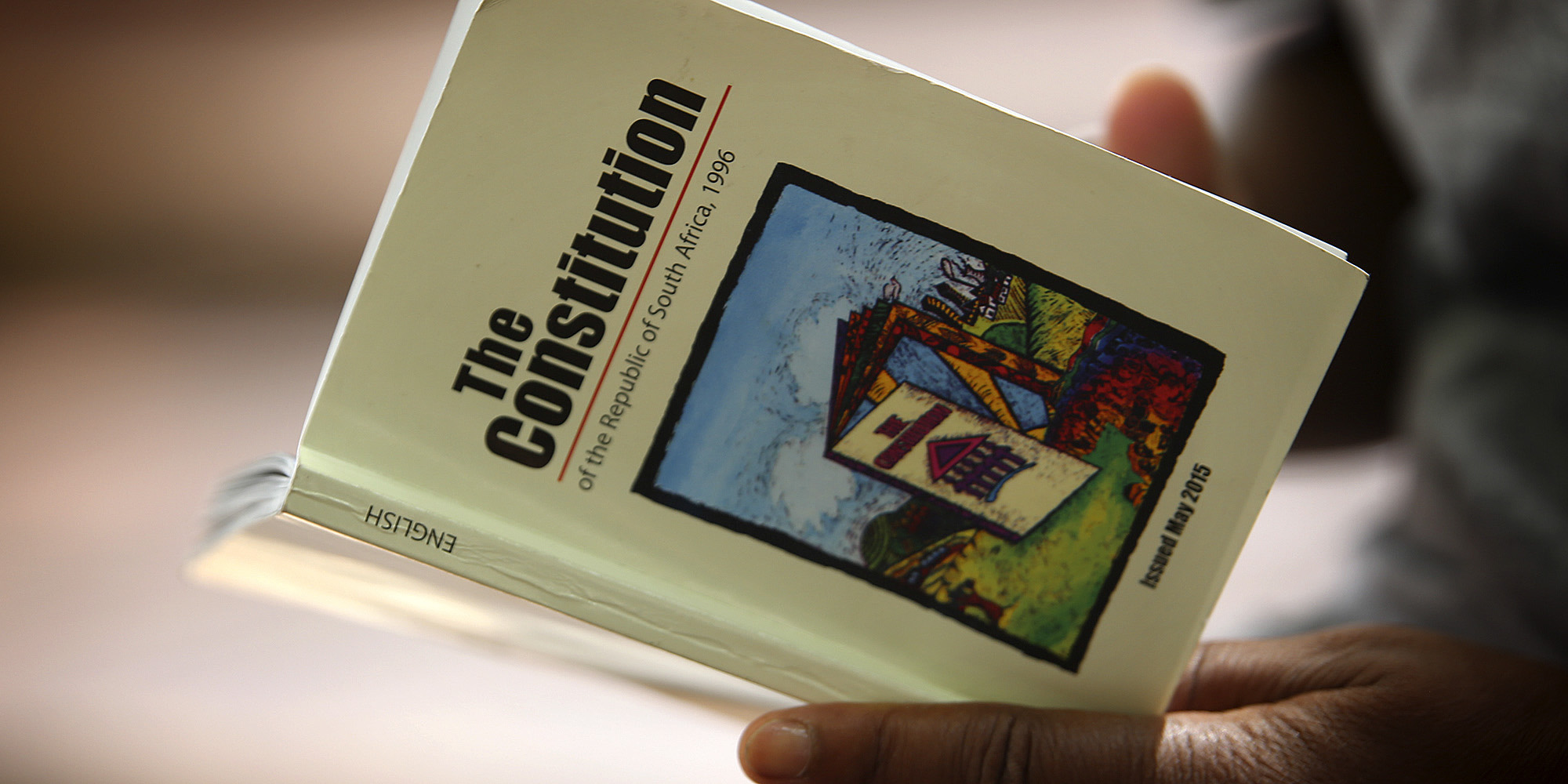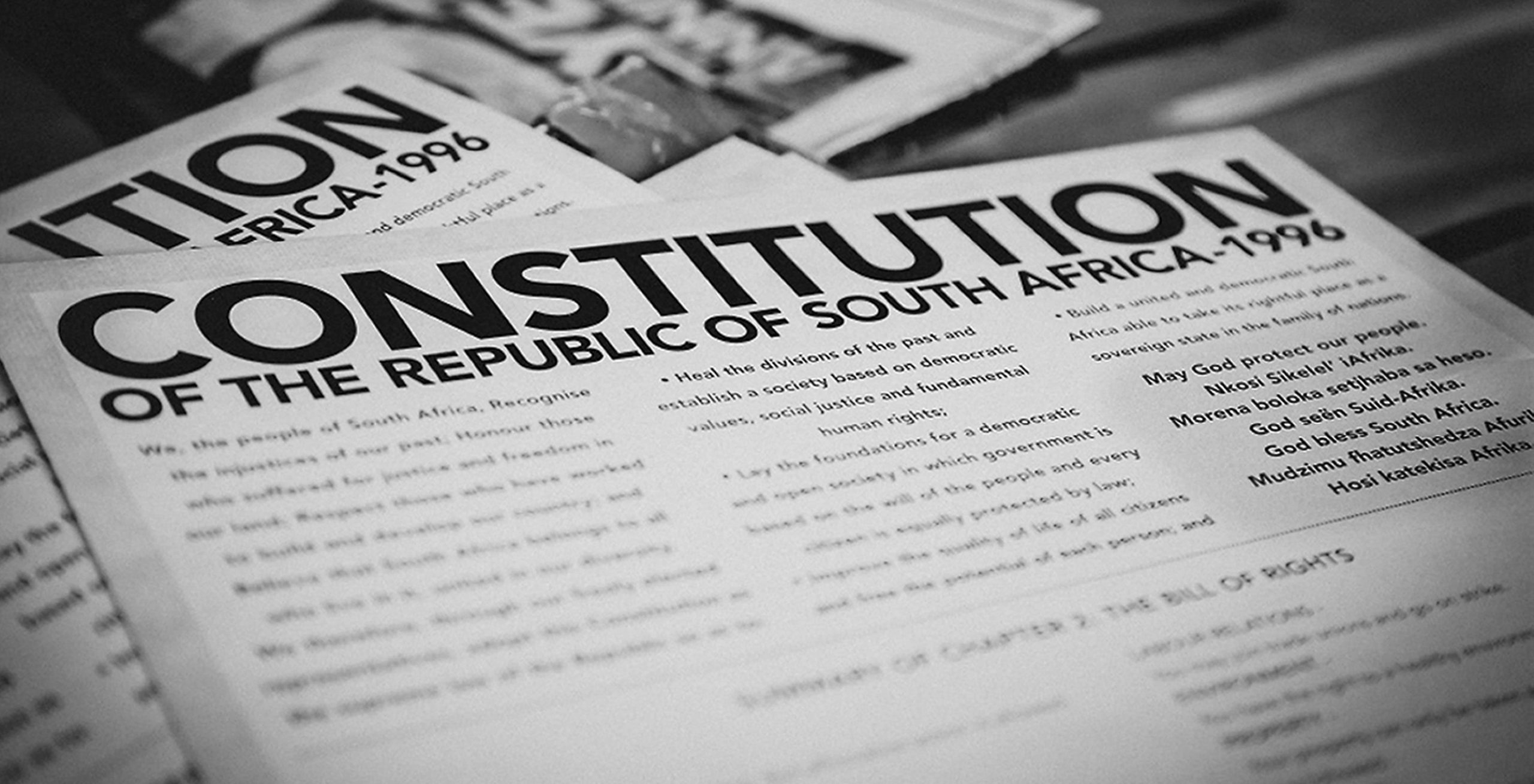Maverick Citizen: Public Impact Litigation
Austerity budgeting (not yet) on trial at Constitutional Court
‘The constitutional commitment to realising the rights of the most vulnerable in society requires a strong and healthy public service – these are complementary constitutional imperatives, not in competition,’ argues civil society organisation in an offer of friendly assistance spurned by the Constitutional Court.
On Tuesday, nine judges of the Constitutional Court heard arguments in Nehawu and Others v the Minister of Public Administration and Others, a case on: “Whether clause 3.3 of the collective agreement entered into between Government and various trade unions in 20128 is valid and enforceable.” You can watch the six-hour hearing here.
Almost all the country’s major unions were lined up against the government in their appeal against a December 2020 judgment of the Labour Appeal Court which found in favour of the government, claiming it was within its discretion to terminate the wage agreement, in no small part because the government was concerned about its “affordability” in the current economically depressed environment.
Since then many social justice activists have been concerned that the appeal court judgment had made a number of far-reaching pronouncements which, if left standing, have profound implications for democracy and human rights.
One of them was:
“National Treasury is given a particular status under the Constitution. The constitutional provision set out in s 216 of the Constitution ensures that National Treasury is one of the guardrails to ensure that the appropriate standard of constitutional governance is adhered to by the Executive. The inclusion of the role of National Treasury in Regulation 79 fits together with the purpose of s 216 of the Constitution. Absent compliance with Regulation 79, it matters not whether Cabinet might have approved the agreement, in that, whatever the Minister of Finance may or may not have said in Cabinet cannot be read to equate to compliance with s 216 of the Constitution read together with Regulation 79.”
Courts ought to write in plainer language, but statements like this seem to make our country’s Treasury the ultimate arbiter of many aspects of government policy.
But despite confusing legalese in light of the cases’ bread-and-butter importance to the lives of our 1,2 million permanent public sector workers, almost 1,000 people watched proceedings on the court’s YouTube channel. Many of them were public sector workers, judging by their constant stream of comments and the hopes they have placed on the case. Put bluntly, “we need money” and “I hope the Constitutional Court understands a binding contract is a binding contract”.
For the whole day, a small army of lawyers wrangled with judges over the legality of the government’s unilateral termination of a three-year wage agreement (2018-2012), after it decided in year three that it could no longer afford it. A large part of the government’s argument is that the wage agreement was “unlawfully concluded… in contravention of Treasury regulations” and therefore could be terminated, even if they had abided by it for two out of its three years.
By contrast, the unions argue that terminating the agreement violates their constitutional rights to fair labour practices and collective bargaining. As William Mokhare SC, representing Nehawu, put it: “Walking away from obligations agreed to at the Public Service Coordinating Bargaining Council sets a bad example; everyone can walk away from an agreement the moment they feel they don’t have money.”

The Constitutional commitment to realising the rights of the most vulnerable in society requires a strong and healthy public service. (Photo: Leila Dougan)
There was a great deal of arguing about legal technicalities, but whatever the outcome of Tuesday’s important hearing it will also have been a missed opportunity for the court to hear, for the first time, legal arguments about the ambit of the Constitution’s power over economic policy pursued by the government. This area of policymaking mostly evades legal scrutiny, yet it often determines what is considered affordable when it comes to the size and cost of the public sector as well as the health, education and other services it delivers as part of the constitutional mandate.
The Constitution calls these socioeconomic rights. Equality and peace in South Africa depend on their realisation.
Enter a friend from the left
In this context on 30 July 2020, the Alternative Information & Development Centre, an NGO formed in 1996 “in response to the democratic transition in South Africa and the new opportunities and challenges it brought those seeking greater social justice within the democracy”, had applied for admission as an amicus curiae (friend of the court) in the case.
The centre was represented by Richard Spoor Inc Attorneys. Its founding affidavit (here) explained that it aimed to “ensure the court is mindful of ensuring that neoliberalism does not silently creep into its reasoning at the expense of constitutional rights”.
The centre was also concerned that if the Constitutional Court found the wage agreement was invalid it should nonetheless make an order that was “just and equitable” i.e. one that appreciates the plight and legitimate expectations of a million workers.
Predictably, but problematically, the finance minister strongly opposed the centre’s admission, including on seven grounds that “it is not qualified to advance averments on expert economic and fiscal issues”.

The Alternative Information & Development Centre was also concerned that if the Constitutional Court found the wage agreement was invalid it should nonetheless make an order that was ‘just and equitable’ i.e. one that appreciates the plight and legitimate expectations of a million workers. (Photo: Gallo Images / Foto24 / Nicolene Olckers)
However, on 13 August, while condoning the centre’s late application, the court dismissed its request on procedural grounds “as it does not comply with rule 10 of the Rules of this Court”. Unfortunately the court didn’t bother to say why.
However by the time its application was dismissed the centre had already submitted written arguments to the Constitutional Court prepared by its advocates, Tembeka Ngcukaitobi SC, Michael Bishop and Jason Brickhill (they are available here). In light of the way the Constitutional Court appeared stuck on a lot of technicalities, these arguments, if they had been heard, might have provided it with a framework within which the court could have evaluated the interpretive arguments about particular clauses of the Constitution and the Labour Relations Act made by counsel on both sides.
Although overlooked by the Court, the Alternative Information & Development Centre’s arguments are useful because they offer a framework that has broader relevance to the debates taking place in our society about austerity, public expenditure and how we narrow gross inequalities and reduce poverty.
The centre argued that the Labour Appeal Court had “failed to approach the key questions from the constitutional paradigm that governs exercises of public power implicating the economy”. In particular, the court had “failed to situate the public service in its constitutional context and to appreciate its crucial role in the realisation of the rights in the Bill of Rights, instead setting the public service against rights”.
This was a reference to the appeal court’s reasoning that the government was exercising its “discretion” in the best interests of the poor by terminating the wage agreement.
For example, the court had said:
“Under the present financial circumstances, it does not appear to be just and equitable to order government to expend significant and scarce financial resources on employees whose jobs are already secured and salaries have been paid in full, particularly in circumstances where the imperative exists for the recovery of the economy to the benefit of millions of vulnerable people. For example, the provision of social grants to fellow South Africans living on the margin could well be imperilled by such a decision, as might the need to pay for significant and critical additional medical costs caused by the pandemic.”
For the first time the centre’s core arguments, had the court deigned to hear them, “set out the Constitution’s governance of economic decisions of the state”; argued that “the Constitution requires a capable state and a healthy public service”; that “cutbacks to the public service undermine this requirement and threaten constitutional rights”; and also “made submissions on what a just and equitable remedy” could have been “in the event that the Court was concerned about the economic implications of the wage increases.”
Presciently, one of the major concerns of the Constitutional Court on Tuesday, like the Labour Court before it, was precisely the issue of affordability. The unspoken premise the judges appeared to accept was that the government had no other alternatives given its fiscal constraints. Inadvertently the ConCourt, in its debate with counsel for the unions, seemed to fail the test of objectivity and impartiality, with many of its questions being posed as if it were in the shoes of the government.
In response to this conundrum that isn’t actually a conundrum, the centre’s heads of argument are simple and bold.
They state: “All exercises of public power are subject to the Constitution. ‘Economic’ decisions are no different… the Constitution governs such decisions and that courts are enjoined to enforce the Constitution notwithstanding the economic implications of their decisions.”
In support of this they point out and cite examples of how “the courts have already, in a long and consistent line of decisions, made orders with direct and significant economic implications” as well as “orders that directly affect the allocation of budgetary resources at significant scale in a range of contexts”.
However, in another novel approach, the centre pointed out how – costs aside – “this is more than an ordinary labour dispute and the affected employees are more than individual employees”.
It argued that “the [Labour Appeal Court] failed to reckon with the place of the public service in the constitutional scheme. Instead, it treated the affected employees as a large (and expensive) contingent in the employ of the state.”

Inadvertently the ConCourt, in its debate with counsel for the unions, seemed to fail the test of objectivity and impartiality, with many of its questions being posed as if it were in the shoes of the government. (Photo: constitutionhill.org.za/Wikipedia)
This approach is wrong, says the centre, because “the public service enjoys a central role in the constitutional scheme. Great constitutional expectations are laid at its door, and in turn the Constitution requires government to adequately resource the public service and manage and remunerate public servants.”
“Cuts to the public service, including wage increase freezes, threaten the rights in the Bill of Rights” and also prevent it from “discharging the constitutional functions of the public service in terms of sections 195 and 197 of the Constitution.”
In another section of its submission the centre argued that after South Africa ratified the International Covenant on Economic, Social and Cultural Rights in 2015 it became bound by the covenant under international law. It quotes statements and guidelines from the UN Committee on Economic Social and Cultural Rights that, they say, “pertinently address the impact of austerity measures, including cutbacks to the public service, on socioeconomic rights” and argue that South Africa should be paying heed to these statements.
This legal language may feel dry, but life-and-death issues of huge importance lie behind it.
South Africa’s public service is overstretched and demoralised, yet massive expectations are attached to it, including to fight corruption. Although the public sector wage bill is large, it is necessarily so, and the overall cost obscures the fact that it is the bloated and expensive management (much of it the result of cronyism and cadre deployment) that needs cutting, not ordinary employees who are mostly underpaid.
In the course of the Covid-19 crisis we have seen time and again how vital public servants can be. Healthcare workers in particular have saved tens of thousands of lives. In the course of the recovery they will be equally if not more important.
For these reasons, in its suggestions on remedy the Alternative Information & Development Centre had proposed that one option for the court could be to “call for more evidence about the consequences of enforcing or not enforcing” the wage agreement. This, it argued, “would allow the court to meaningfully assess the truth of the claim that the money needed to pay public servants what they were promised can only come from the budget for social grants, education and other social goods – as Treasury claimed and the [Labour Appeal Court] accepted.”
The centre’s bold move to be heard by the Constitutional Court may not have succeeded this time, but the issues it raises go to the heart of the debates South Africa should be having about its Constitution and pathways to equality and social justice. DM/MC




















 Become an Insider
Become an Insider
Comments - Please login in order to comment.